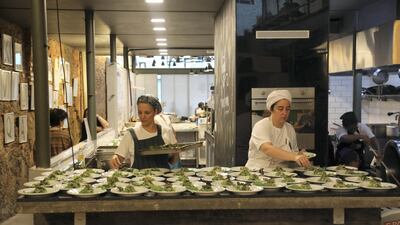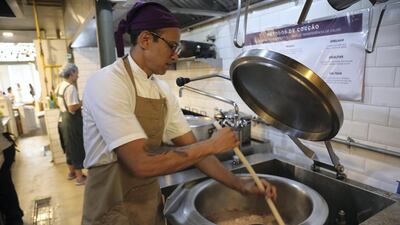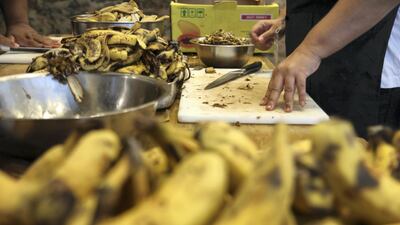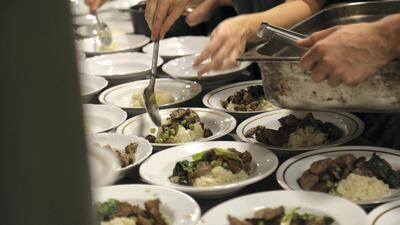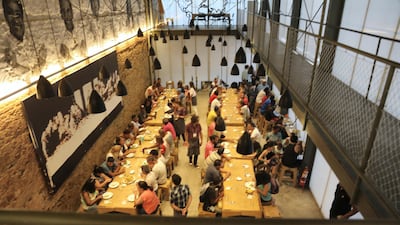Plates of delicately assembled rocket, kale and beetroot-stem salads drizzled in a creamy yoghurt sauce line the immaculate kitchen of Refettorio Gastromotiva, a sleek dining hall designed by prize-winning architects in downtown Rio de Janeiro.
A team of uniformed waiters expertly dispatches the dishes to hungry diners sitting at stylish, wooden banquet tables, with pieces of modern art hanging on the walls of the airy, minimalist space.
The scene has all the hallmarks of fine dining, except the three-course meal is completely free, it is made from food that would have otherwise been thrown away, and the guests are not wealthy clientele but homeless people from the nearby, downtrodden Lapa, a neighbourhood known for its nightlife in Brazil’s second largest city.
“Eating here is like receiving a warm hug because the food is cooked with passion,” says diner Jose Maria Alves da Silva. “Every day is a surprise. I cannot get three courses of food like this anywhere I go, especially where I’m served with such respect.”
The 51-year-old moved to Rio from the north-eastern city of Natal five years ago in search of work. But he fell on hard times and could not afford to pay rent. Mr Da Silva now regularly eats at the Refettorio through a local community church.
Opened in August 2016, the Refettorio feeds nearly 100 guests every weekday night, but organisers hope to one day treble that capacity, and even offer lunches. To date, they say 140,000 meals have been served in Rio, the equivalent of 100,000 kilograms of food. In a 6.5 million-strong city blighted with poverty and homelessness – 14,000 people live on the streets – it is sorely needed sustenance.
Key to the philosophy of the Refettorio is reducing waste and “social gastronomy”, the idea of linking food to social change. Brazil is among the world’s 10 biggest food wasters, with 30 per cent of its fruit and vegetable harvest thrown away. One of the United Nations’ Sustainable Development Goals is to halve global food waste by 2030.
“We’re fighting against surplus and trying to show [what] can be done with a different mindset,” says David Hertz, a Brazilian chef and the Refettorio’s co-founder. “It’s important to understand the social context of Rio, where there’s a lot of poor communities. Most of these people just want to be seen and heard, because they never normally are. We want to give dignity and belonging to diners – and a sense of hope.”
Not even banana skins are thrown away. Instead they are carefully sliced, rolled in cinnamon and baked – to go along with fresh banana ice cream made for dessert. On sale in the adjacent shop is a beer made from stale bread, whose production creates yeast to make even more bread. The cycle is dizzying.
The restaurant's produce is donated by companies and prepared by a team of trainees led by professional chefs, with regular guest appearances from celebrity ones such as Frenchman Alain Ducasse, a winner of multiple Michelin stars. Most of the team working in the kitchen, however, come from Rio's slums, or favelas, and have taken a free three-month training course.
Rodrigo Ottoni, 38, a former sailor in the Brazilian Navy, started at the Refettorio by taking one one its courses in 2018. Six months ago he began working with them as a full-time chef.
“Cooking is the favourite job of my life,” said Mr Ottoni. “It feels so nice to work here, you are making a real change for the guests. I feel so grateful.”
For the Refettorio, the challenge remains making the project financially sustainable. Charitable donations from large businesses and fundraising events at the venue pay the majority of the bills. But donated food deliveries are never guaranteed or reliably scheduled. “Until yesterday, we'd completely run out of food,” says Mariana Vilhena, an employee. “But the demand for it is still growing.”
The diners are of all kinds of profiles: an old bearded man wearing a Flamengo football shirt sits a few chairs down from a pair of teenage girls and a middle-aged woman with peroxide blonde hair. It is clear there is a huge appetite for facilities that help Rio de Janeiro’s most vulnerable.
“We only offer dinner here, but people need doctors, medication, yoga, reading, and legal services – we try to make people a part of that system,” said Ms Vilhena. “There's a process of restoring their dignity, their identity and self esteem.”
